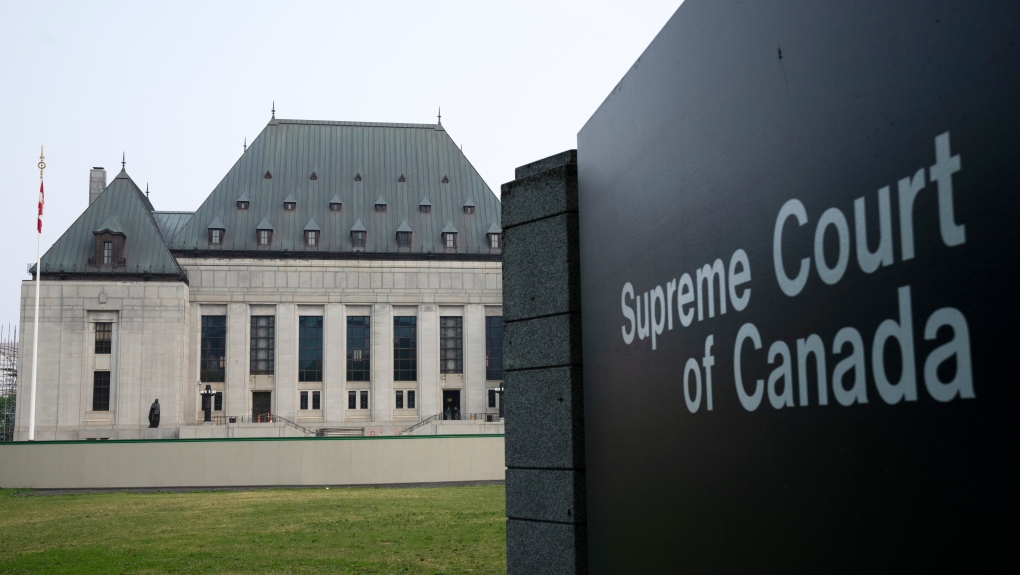
Missing 3-year-old boy found dead in creek in Mississauga, Ont.: police
A three-year-old boy has been found dead a day after he went missing in a park in Mississauga, Ont., Peel police say.
The Supreme Court of Canada on Friday dismissed the appeal of a man whose Charter rights were breached during a police investigation that led to the discovery of 100 lbs. of cannabis.
As a result of the ruling Friday, George Zacharias’s conviction for possessing marijuana for the purpose of trafficking was upheld.
Canada's top court declined to exclude evidence that Zacharias had said was an infringement of his rights under the Canadian Charter of Rights and Freedoms.
The case focused on whether police violated the accused’s Charter rights and if the evidence collected after police’s initial traffic stop should be excluded from trial.
During the trial, Zacharias argued that the drug evidence seized by police should be excluded from trial under Section 24(2) of the Charter. This section states that evidence obtained in a way that breached the accused's rights may be excluded from trial "if admitting it would bring the administration of justice into disrepute." He said the police had breached his Charter rights to not be subjected to unreasonable search or seizure and his right to not be arbitrarily detained, according to the court.
Zacharias was pulled over for a traffic stop on a highway near Banff, Alta., in February 2017 because he was driving a truck with a burned-out light and illegally tinted windows, according to the court. A police officer made observations that made him suspect that he was carrying drugs. The officer detained him to ask him more questions, known as “investigative detention," and called for a sniffer dog, which detected drugs. The officer concluded that he had "reasonable and probable grounds" to arrest Zacharias for possession of a controlled substance.
After searching Zacharias’s truck, police discovered a "large quantity" of cannabis and cash. Zacharias was arrested again for possession for the purpose of trafficking. He was then searched and arrested a third time for possession of proceeds of crime over $5,000.
The trial judge found the police breached Zacharias’s Charter rights in conducting a sniffer search and investigative detention, but ruled that the evidence should not be excluded under section 24(2), according to the court. The Court of Appeal of Alberta dismissed his appeal when he argued the trial judge had failed to consider whether the police’s conduct after the initial violations also breached the Charter.

A three-year-old boy has been found dead a day after he went missing in a park in Mississauga, Ont., Peel police say.
Against the rainy Paris night sky, Celine Dion staged the comeback of her career with a powerful performance from the Eiffel Tower to open the Olympic Games.
Premier Danielle Smith said Friday afternoon in Hinton while weather conditions are cooler, the Jasper fire is still considered out of control and that Jasper residents can expect to be away from their homes 'for several weeks.'
An Irish museum will withdraw a waxwork of singer-songwriter Sinéad O'Connor just one day after installing it, following a backlash from her family and the public, it told CNN in a statement on Friday.
A Winnipeg senior is getting soaked with a six-figure water bill.
Nearly two weeks after Donald Trump’s near assassination, the FBI confirmed Friday that it was indeed a bullet that struck the former president’s ear, moving to clear up conflicting accounts about what caused the former U.S. president’s injuries after a gunman opened fire at a Pennsylvania rally.
Orillia OPP arrested and charged a driver with impaired driving after flashing their high beams.
The lawyer for a former judge whose claims to be Cree were questioned in a CBC investigation says his client is not considering legal action against the broadcaster after the Law Society of British Columbia this week backed her claims of Indigenous heritage.
Scotiabank says it has fixed a technical issue that impacted direct deposits on Friday morning.

As fire threatened people in Jasper National Park, Colleen Knull sprung into action.
Video posted to social media on Thursday morning appears to show the charred remains of a Jasper, Alta., neighbourhood.
A Saskatchewan-born veteran of the Second World War was recently presented with France's highest national order.
A local First Nations elder and veteran is helping to bring the Ojibwe language to a well-known film for the first time.
A cat who fled her Montreal home nearly a decade ago has been reunited with her family after being found in Ottawa.
A woman in Waterloo, Ont. is out thousands of dollars for a car crash she wasn’t involved in.
A swarm of bees living in a lamppost in Winnipeg’s Sage Creek neighbourhood has found a new home for its hive.
Around 100 acres of Manitoba Crown Land near the Saskatchewan border is being returned to the Métis community.
Nova Scotia is suspending the licensed Cape Breton moose hunt for three years due to what the province is calling a “significant drop” in the population.
 The Supreme Court of Canada is seen, Friday, June 16, 2023 in Ottawa.THE CANADIAN PRESS/Adrian Wyld
The Supreme Court of Canada is seen, Friday, June 16, 2023 in Ottawa.THE CANADIAN PRESS/Adrian Wyld